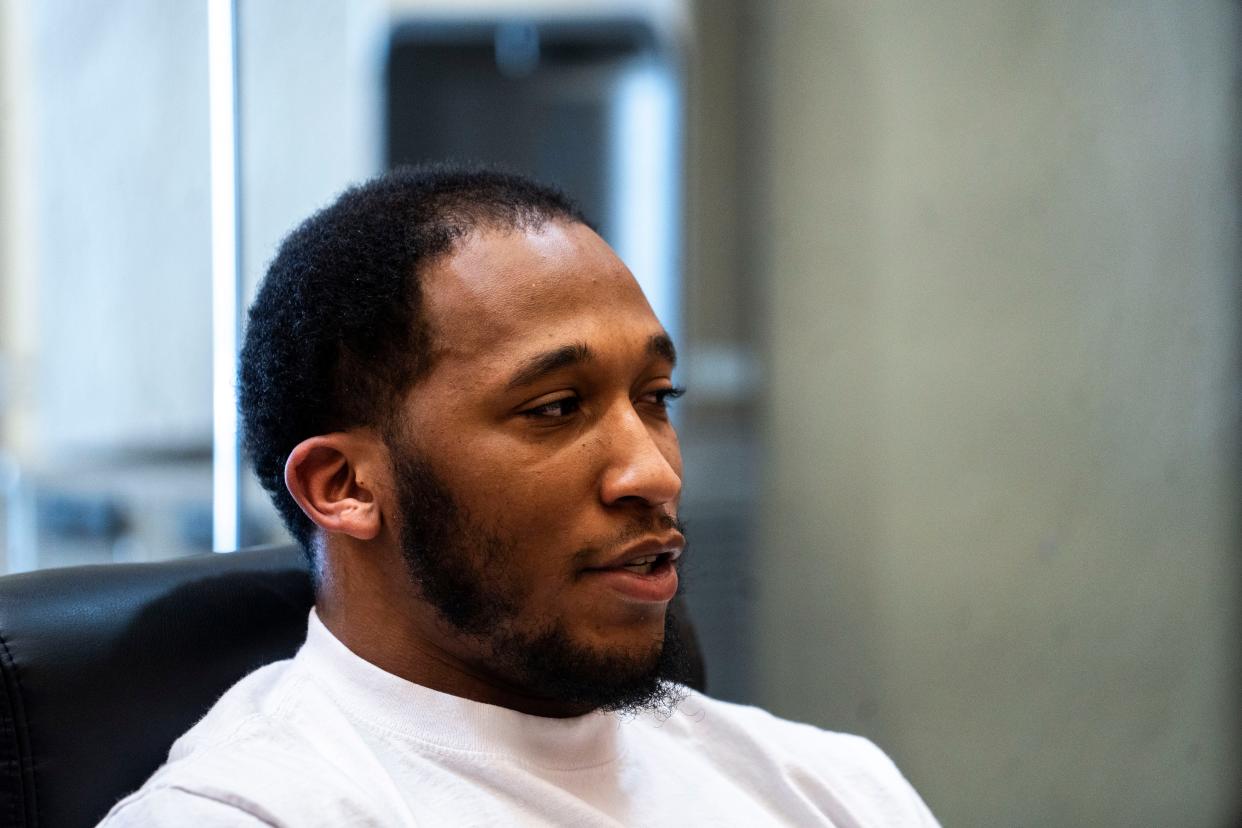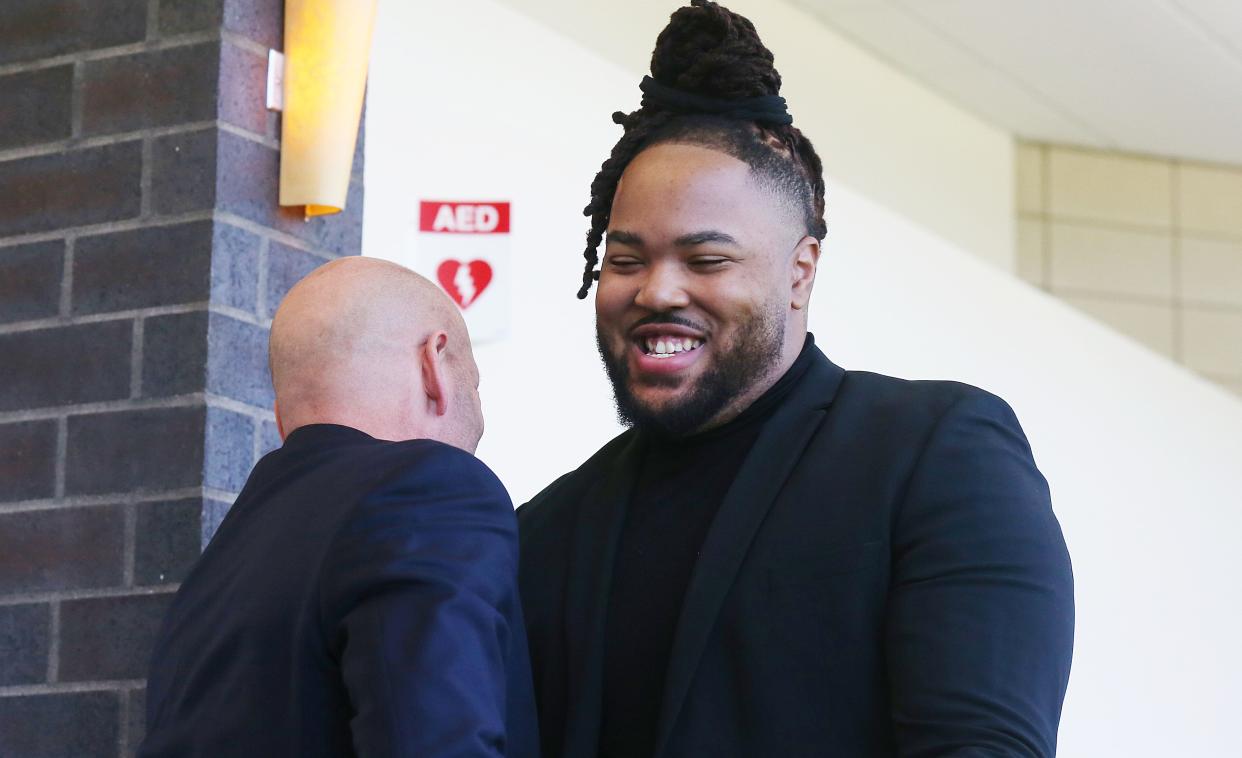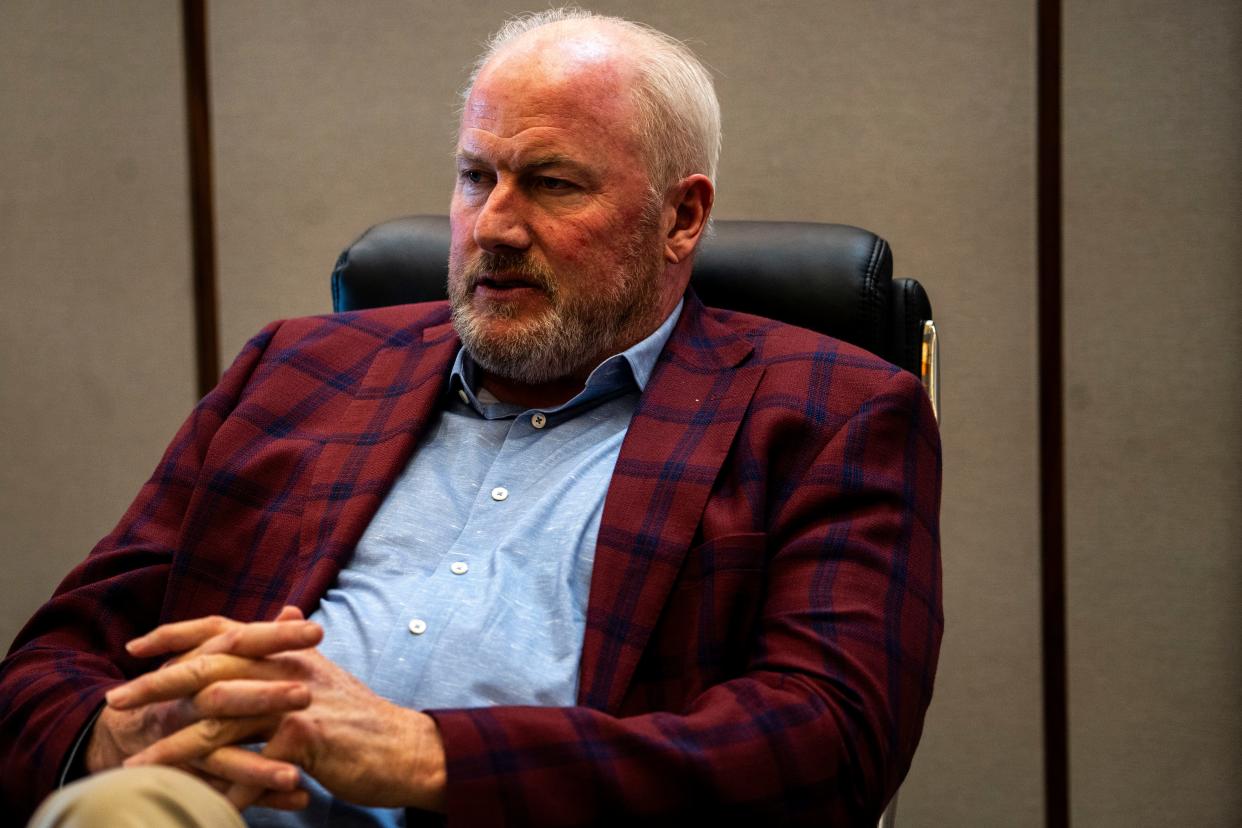Prosecutors drop charges against former Iowa State athletes in gambling investigation

Ex-Iowa State University football player Jirehl Brock learned he no longer faced criminal gambling charges Friday morning when his lawyer told him over the phone that a Story County prosecutor had asked a judge to dismiss the charges.
Brock, 23, felt relieved. Even though defense attorneys pried loose evidence in recent weeks that raised questions about the legality of the Iowa Division of Criminal Investigation’s gambling probe into student athletes at ISU, Brock had still worried that a jury would convict him.
Friday’s win, however, didn't leave him unscathed. Like every other football fan, the former Iowa State running back has followed the NFL Scouting Combine, when prospective pros flash their strength and speed for teams.
“I was supposed to be out there this weekend,” he said of the event. “That’s something that I have to live with, and that’s something that I’ll always have to live with. It’s not a good feeling. But it’s something that, in a way, I brought on myself ― but in a way I had struck on me.”
Assistant Story County Attorney Benjamin Matchan filed a motion Friday asking a judge to dismiss the charges against Brock and three other former Iowa State athletes: wrestler Paniro Johnson, defensive lineman Isaiah Lee and defensive end Eyioma Uwazurike. Matchan cited an email presented by defense attorneys this week that showed the manufacturer of bet-tracking software had pulled the DCI’s access to its service.
GeoComply, which makes the tracking software, told the Iowa Racing and Gaming Commission in the Jan. 26 message that it was disabling the DCI’s account because criminal investigators “may have exceeded the intended and outlined scope of its … access-and-use privileges.”
The attorneys for the players filed a motion this week, asking a judge to suppress any information that the DCI gathered from the software because Special Agent Brian Sanger allegedly testified in a yet-unreleased deposition that he did not get a warrant before probing gambling activity on college campuses. They also told a judge that DCI agents lied to athletes, telling them before interviews that the players were not targets in a criminal investigation.
In his motion, Matchan wrote that GeoComply “has failed to respond” to his inquires this week.
“The state no longer believes further prosecution in this matter is in the interest of justice,” he wrote.
Stephan Bayens, commissioner of the Iowa Department of Public Safety, said in a statement that the decision to drop the cases was "disappointing" and said the prosecutors "repeatedly shared with us their belief that the Division of Criminal Investigation’s actions were legal."
"I understand why this investigation and the resulting charges have generated so much attention and such strong opinions," Bayens said. "We love our college sports here in Iowa, myself included. Had this situation not involved college athletes, the public perception may have been entirely different.
"As law enforcement officers, we take an oath to uphold the law and we do so without exception, even when it’s difficult. Throughout the investigation and subsequent prosecution, we continually reviewed our actions and I fully stand behind the investigation and the agents who did the work. I want to thank them and their families for their service to Iowa."
Lawyer for ex-ISU player, now with Denver Broncos, planned to cross-examine DCI agent

The prosecutor’s decision comes four days before he and defense attorneys were scheduled to hold a hearing on the motion to suppress evidence in the cases at the Story County Courthouse. The defense attorneys accused DCI agents, in addition to conducting a warrantless search for online gambling activity, of lying to the athletes about the fact that they were targets in a criminal investigation, obtaining incriminating statements from them.
According to a Jan. 23 court filing by Johnson's attorney, at least one agent, Mark Ludwick, testified in a deposition that he had assured a player he interviewed that he would not be prosecuted, based on representations from his supervisor, only to have that supervisor later praise him "for obtaining a confession."
Attorney Van Plumb, who represents Lee and Uwazurike, said he had planned to cross-examine Sanger, who led the investigation, in next week's hearing. According to previous motions, Sanger said during a January deposition that he did not request a warrant before using GeoComply’s software to check whether people placed online bets from inside ISU and UI athletics buildings.
Plumb said he received a call from Matchan an hour after he filed subpoenas Friday in connection with the hearing.
“They did not want to go forward with a motion to suppress hearing with everybody that was called to testify,” he said.
In addition to the motion to suppress, defense attorneys demanded that prosecutors turn over Sanger’s Kibana search history.
DCI says evidence obtained in 'constitutionally permissible manner'

The players’ lawyers have long argued that the DCI agents’ probe violated GeoComply’s terms of service. They said the company created the software to ensure sportsbooks like FanDuel and DraftKings complied with state gambling regulations.
The attorneys bolstered their argument in a motion Tuesday, when they shared the Jan. 26 email from a GeoComply representative to the Iowa Racing and Gaming Commission.
More: Iowa State player's father recorded calls with gaming commission leader over betting probe
The DCI has previously defended its investigation. In a Jan. 31 statement, the DCI wrote that agents “conferred with legal counsel” to make sure their approach was legal before conducting the investigation.
“The evidence was obtained in a constitutionally permissible manner,” the statement said.
It did not identify the lawyer who advised the DCI. On Jan. 23, Iowa Attorney General Brenna Bird in a statement to WHO-13 indicated it was not her office, adding that she was not concerned about whether the DCI acted under proper authority.
More: Iowa lawmakers fret about privacy rights after allegations against sports betting probe
"Those cases aren't in my office," she said. "And my understanding was the investigation was done by (the Iowa Department of Public Safety), so they would be the ones that could answer that question."
According to defense attorneys' motions, GeoComply’s software showed Sanger sportsbook account numbers that had been used inside the athletics buildings. Investigators then obtained the names of the users linked to those accounts.
Based on that information, prosecutors charged some defendants with underage gambling for allegedly placing bets. Prosecutors also accused defendants of using FanDuel and DraftKings accounts registered to their parents or friends, charging them with identify theft, a felony.
Among the defendants whose charges were dropped Friday, the DCI accused:
Brock of placing about 1,300 bets for about $12,000.
Johnson of placing about 1,300 bets for about $46,000.
Lee of placing 115 bets for $885.
Uwazurike of placing 801 bets for about $21,400.
The DCI also accused Brock, who has since graduated, of placing bets on two Iowa State games he played in and Lee of placing bets on 12 in which he was involved. In addition, it accused Uwazurike of betting on two Iowa State games and five Denver Broncos games while a member of those teams.
Uwazurike remains suspended by the NFL, a league spokesperson told the Des Moines Register earlier this week.
DCI Assistant Director David Jobes previously told the Register that the investigation netted criminal charges against 24 athletes and student managers at ISU and UI. Of those, he said on Jan. 23, 16 defendants pleaded guilty to underage gambling. Prosecutors referred one case to juvenile court, where proceedings are private.
Prosecutors agreed in September to drop charges against former Iowa State tight end DeShawn Hanika after they missed a deadline to present an indictment to the defendant.
A case against University of Iowa men’s basketball student manager Evan Schuster is still pending. His attorney, Leon Spies, did not return a call or email seeking comment Friday.
It was not immediately clear what impact the dropping of charges in the ISU cases might have on those against University of Iowa players.
DPS chief: Concerns about college athlete gambling remain
In his statement, Bayens, the Department of Public Safety chief, pointed to worries that the legalization of gambling on college sports could lead to corruption, and that serious risks remain.
"During a review of anonymous data points, anomalies were observed at athletic facilities that only individuals associated with NCAA-sanctioned sports teams had access," he said. "This was concerning because sportsbooks must seek to prohibit sports wagering by coaches, athletic trainers and players as required by Iowa law. Also, individuals with access to these facilities would possess insider information, could impact outcomes, and tended to be underage.
"Given these red flags, agents obtained subpoenas seeking the names on the accounts affiliated with those data points," Bayens said. "When the information was received, it became evident that many account holders lacked any real connection to the places flagged by the data, strongly suggesting fraudulent activity or identity theft. The Department investigated only these accounts."
He said the investigation "uncovered concerns of a seismic magnitude within Iowa’s sports gambling industry. In 2023 alone, $2.4 billion dollars in sports bets were placed in the state with 91% of those being placed online. Existing guardrails were insufficient to deter the creation of fraudulent accounts, gambling by prohibited persons, or identity theft."
According to the DCI’s criminal complaint, Brock placed bets using a FanDuel account registered to his girlfriend, Lindzey Paysen. Among other bets, Brock allegedly gambled on his team’s games against Iowa, Kansas State and Texas Tech in 2022.
He told the Register on Friday that he began gambling out of boredom, when he saw a blitz of ads for sportsbooks.
“I saw it on every single TV,” he said. “You would watch a game. ‘Oh. FanDuel. Here’s a free $100 if you bet $5.’”
“They’re surrounded by all of their classmates who are just normal college students,” Paysen added. “This is what they do all the time. That’s what’s everyone talked about.”
Brock said he knew players weren’t supposed to gamble. He said the team discussed every NCAA compliance issue during a meeting that, in his estimation, lasted a total of about 10 minutes. He said the team did not emphasize gambling violations at the time, something he suspects has since changed.
At the same time, Brock conceded that he should not have placed bets.
“I 100% understand why the rules are the way they are," he said. "You can get into where people will fix matches and things like that. I made a mistake.”
A native of Quincy, Illinois, Brock began playing flag football in kindergarten and dreamed of playing in the NFL. He was bigger and faster than most kids in his youth leagues, and he received a scholarship offer from Iowa State as a high school sophomore.
He didn’t stand out in his first four years in college, rushing for 445 yards and a single touchdown in 2022. But he spent the first three years behind Breece Hall, an All-American and current New York Jet. Brock said he believed a strong final season would have set him up as a draft prospect.
Instead, Brock left the team in August when prosecutors filed criminal charges. His said his social life had been ripped from him. The team no longer filled his daily schedule with weight training, practice and film study. Brock was banned from the team’s athletic buildings.
“I’m not a college kid anymore,” he said. “I’m not going out with the team at night and stuff anymore. I’m not having fun with the guys like I used to because, you know, you’re not in that setting with them all the time. It’s a hard thing you have to live with. You’re losing a part of your life.”
Paysen said her boyfriend struggled to find a new identity in the wake of the gambling case.
“They really don’t prepare athletes to get ready for the real world,” she said. “They kind of just throw you out there.”
During an interview Friday afternoon, Brock didn’t answer when asked if there were any barriers to an NFL team letting him try out in the coming months. His attorney, Matthew Boles, cut in, saying that the defendants are “drained.”
“Every one of these people have been vilified,” Boles said, “like this is public enemy No. 1.”
Asked what his goals are now, Brock said, “Get out of Iowa.”
Tyler Jett is an investigative reporter for the Des Moines Register. Reach him at tjett@registermedia.com, 515-284-8215, or on Twitter at @LetsJett. He also accepts encrypted messages at tjett@proton.me.
This article originally appeared on Des Moines Register: Former Iowa State athletes no longer charged in gambling investigation
